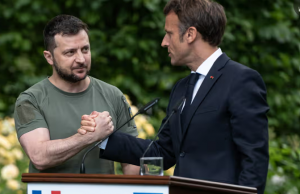Campaigning in Europe comes easily to populists but less so to centrists. A single word printed in large letters – “diesel” – is enough for the German far-right Alternative für Deutschland (AfD) to tell voters exactly where it stands on the climate debate.
The modern European electorate is so angry about so much – the green deal, migrants, electric cars, cultural diversity, open markets, Europe, politics itself – it is hard for centrists to find a foothold.
In the run-up to the elections for the European parliament, which will be held on 6-9 June, however, Ukraine, and the implications of a Russian threat, has become a go-to issue for centrists as they seek to fend off the populist challenge from left and right.
It might seem an artificial rallying point: 512 members of the outgoing European parliament voted in favour of the last aid package to Ukraine and only 45 against, with 63 abstentions. But the connections between Moscow’s interests and the extreme right, particularly those parties in the European parliament’s Identity and Democracy (ID) group, are seen as a rich seam.
Read more
Take Germany. On the right, the AfD – itself recently expelled from the ID group- has been pushing the line that sanctions on Russia only damage Germany. It wants Nord Stream 2 reopened. On the left, the new nationalist party launched by the charismatic politician Sahra Wagenknecht also opposes arms to Ukraine. “No, weapons don’t bring peace, weapons bring more war and weapons bring more death. That’s the reality,” she has said.
On the one hand, the centre arguably has no option but to fight back against this kind of argument. But it also senses an opportunity: that sympathy for Kyiv remains strong and that the issue has the capacity to divide the far right.
The French president in particular has made Ukraine a rallying point to defeat populism, making it the central theme of the campaign launch in Lille.
Speaking in Berlin, and clearly thinking of Marine Le Pen, Emmanuel Macron said: “In all our countries there are false pacifists in Europe, people who say: ‘we are in favour of stopping immediately’. Moreover, if we follow the voice of the Russian president, he goes around the world saying: ‘I am for peace if they still give away the territories that I invaded by force.’ That’s not peace. This is not our vision of peace. I have said it again and again, peace can only be lasting and therefore in compliance with international law.”
François Ruffin during the weekly session of questions to the government at the national assembly in Paris, France.
View image in fullscreen
François Ruffin during the weekly session of questions to the government at the national assembly in Paris, France. Photograph: Jacques Witt/SIPA/REX/Shutterstock
Macron’s credentials as a scourge of Russian imperialism can be challenged. Indeed François Ruffin, an MP for La France Insoumise, has argued: “We have no lessons to learn from a man who welcomed Vladimir Putin at Versailles and at Fort Brégançon, when Crimea was already invaded, Anna Politkovskaya and other opponents assassinated.”
But Macron has doubled down. With the symbolic backdrop of the 80th anniversary of D-day commemorations this week, he will discuss with Volodymyr Zelenskiy plans for French trainers to operate inside Ukraine to help liberate the country.
Macron is by no means the only European leader leaning in on Ukraine to help galvanise their base. Across Europe, in different ways and to varying extents, Ukraine has become a dividing line in these elections, in the hope that it will prove the populists’ achilles heel.
The Guardian

